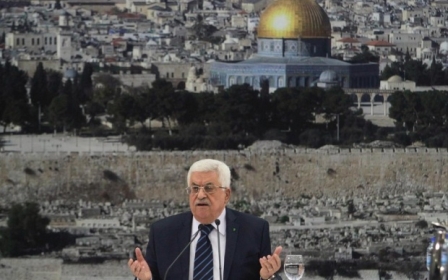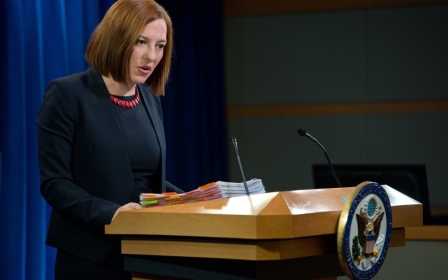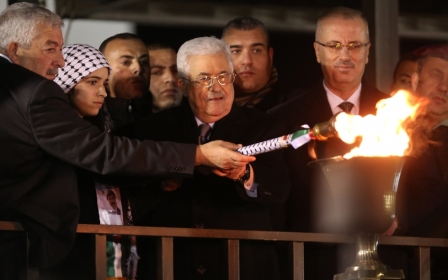Palestinians to push for statehood at renewed Security Council

Chief Palestinian negotiator Saeb Erekat said that the Palestine Liberation Organization (PLO) was working on amending and resubmitting a draft resolution for Palestinian statehood, an earlier version of which was voted down at the UN Security Council (UNSC) last week.
"The amendments will take all matters into consideration and it [the draft resolution] will be submitted again [to the UNSC] if the motion gets the support of all Arab states," Erekat said in an interview with The Anadolu Agency at his office in Ramallah in the occupied West Bank.
Erekat said that Palestinian representatives would meet members of the Arab League's peace-monitoring committee within ten days to discuss the draft, following a request to this effect by Palestinian Authority (PA) President Mahmoud Abbas to Arab League Chief Nabil al-Arabi.
Speaking to AFP, Abbas's spokesman Nabil Abu Rudeina said the resolution would be presented again "soon", without saying exactly when.
Three countries that did not vote in favour of last week’s Palestinian UN Security Council draft resolution are no longer a part of the 15-member body.
The UN's most powerful body rejected the 30 December measure that called for an end to Israeli occupation of Palestinian territories within three years, as the motion failed to secure the minimum of nine votes.
In addition to Australia and the US voting against the resolution, the UK, Nigeria, Rwanda, South Korea and Lithuania abstained, while Jordan, France, Russia, China, Argentina, Chad, Chile and Luxembourg voted in favour.
As one of the five permanent members on the Council that holds veto power, the US was widely expected to block the motion's passage, but mustering the minimum number of "yes" votes would at least force Washington to a decision that some say might have imperilled the American-led military coalition with Arab states in Iraq and Syria.
Abbas, however, said Sunday that Palestinians were consulting with Jordan on resubmitting the draft resolution.
"The Palestinian leadership insists to move ahead with its political and diplomatic struggle," Abbas said. "It will continue to do this until a Palestinian state is established within the 1967 borders with East Jerusalem as its capital."
A more sympathetic UNSC
Media reports say the Palestinians hope the Security Council's new non-permanent members, which began their terms on 1 January, will be more sympathetic toward their resolution.
Angola, Malaysia, New Zealand, Spain and Venezuela on Thursday replaced Argentina, Australia, Luxembourg, South Korea and Rwanda, whose terms expired at the end of 2014. Others still serving are Chad, Chile, Jordan, Lithuania and Nigeria.
The Palestinian Authority's Foreign Minister Riyad al-Maliki said Monday that he had “received assurances from the new members who joined the Security Council that they would support the Palestinian demand to end the occupation," according to New York-based Jewish news website Algemeiner Journal.
"Chile, Venezuela and Malaysia are behind us," the journal quoted Maliki as telling Voice of Palestine Radio. He reportedly said that the Palestinian Authority was also "in contact” with New Zealand and Angola to secure their support.
Malaysia's UN mission told The Anadolu Agency on Monday that it would be supportive of the motion if it were brought again to the Council, while New Zealand said it favoured a solution within the framework of the UN-proposed two-state solution through negotiations between the two sides.
"Given the threat the conflict poses to international peace and security, we believe the Security Council has a role to play in the Middle East peace process and are assessing the best approach for its next steps," read a statement from New Zealand's UN mission.
Spain, whose parliament urged its government in November to recognize Palestine as a state, is widely expected to vote in favour of the resolution.
Venezuela is also expected to vote “yes.”
However, if the motion is supported then the US is expected to veto it.
'International law allows us to resist our occupiers'
The resolution sets the end of 2017 as the deadline for Israeli security forces to fully withdraw from the occupied territories and names East Jerusalem as the capital of a future Palestinian state based on pre-1967 borders.
It also calls for a comprehensive peace deal to be reached within a year.
In response to the resolution's setback, the Palestinian Authority signed the Rome Statute – the founding treaty of the International Criminal Court – along with applications for Palestinian membership in 20 international treaties and organizations.
Full membership to the Hague-based court would allow the Palestinians to bring lawsuits against Israel for war crimes.
"Israel knows very well what President Abbas' decision to sign the treaties entails," Erekat told AA.
"They know they can't sue us, because we're under occupation, and international law allows us to resist our occupiers," he added.
He was referring to a recent warning by Israeli Deputy Foreign Minister Tzachi Hanegbi that Israel would be able to sue the PA at the ICC for alleged "involvement in terrorism."
"If they fear prosecution so much, they should keep their hands off us," Erekat said.
Erekat also said the PA would convene soon to discuss a response to Israel's recent decision to stop the transfer of Palestinian tax revenues collected on behalf of the PA, a move opposed by Washington.
The revenues, estimated at some $175 million a month, are an essential source of income for the PA, which uses most of it to pay the salaries of the recently-formed unity government's civil servants.
"This will not lead to the dissolution of the PA, which was created to bring the Palestinian people from occupation to independence," Erekat said.
"It would be impossible for Israel to turn the PA into a merely bureaucratic entity," he added. "The occupation must assume all responsibilities enshrined in the 1949 Geneva Conventions."
Hamas opposes return to UNSC
Meanwhile, Hamas said Monday it was "totally opposed" to Abbas's plans to re-submit to the resolution.
"Hamas is totally opposed to any return to the UN Security Council by the Palestinian Authority," spokesman Sami Abu Zuhri said in a statement.
"Such a step would be political foolishness which plays a dangerous game with the destiny of our nation.
"Mahmud Abbas and the leadership of the Palestinian Authority should completely stop this political foolishness," Abu Zuhri said.
The roots of the Israel-Palestine conflict date to 1917, when the British government, in the now-famous Balfour Declaration, called for "the establishment in Palestine of a national home for the Jewish people."
Israel occupied East Jerusalem and the West Bank during the 1967 Middle East War. It later annexed the holy city in 1980, claiming it as the capital of the self-proclaimed Jewish state – a move never recognized by the international community.
Palestinians want a state of their own in the Gaza Strip and the West Bank, with East Jerusalem, currently occupied by Israel, as its capital.
New MEE newsletter: Jerusalem Dispatch
Sign up to get the latest insights and analysis on Israel-Palestine, alongside Turkey Unpacked and other MEE newsletters
Middle East Eye delivers independent and unrivalled coverage and analysis of the Middle East, North Africa and beyond. To learn more about republishing this content and the associated fees, please fill out this form. More about MEE can be found here.




